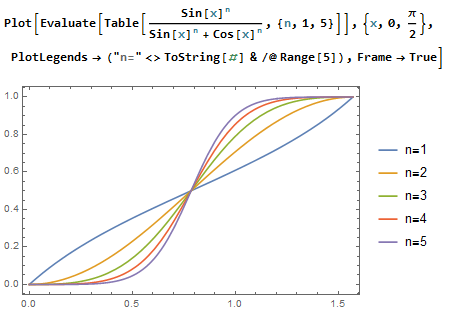So I have to integrate $$\frac{\sin^n x}{\sin^n x + \cos^n x}$$ and am coding this in Mathematica with
(((Sin^n)[x])/(((Sin^n)[x]) + ((Cos^n)[x])))
with the bounds $0$ and $\pi/2,$ where $n$ takes on various integer values.
I programmed the problem so that $n=1$ then $n=2$, etc...but every time I try to get the output, I only get back the integration symbol. For example, if I program $n=2$ and then do the integration command- the output is
(((Sin^2)[x])/(((Sin^2)[x]) + ((Cos^2)[x]))),
but does not solve it. Anyone know how to help or fix this??
Update: Even with the syntax fixed, Mathematica does not solve it, with or without assumptions:
Integrate[Sin[x]^n/(Sin[x]^n + Cos[x]^n), {x, 0, Pi/2},
Assumptions -> n > 0 && n \[Element] Integers]


(Sin^2)[x]when that syntax is incorrect, you should instead write it asSin[x]^2$\endgroup$n, as shown in two of the answers, but it cannot be evaluated with a unspecified parametern. (Of course we often get this kind of question, which reveals limitiations ofIntegrate.) $\endgroup$